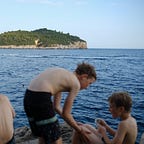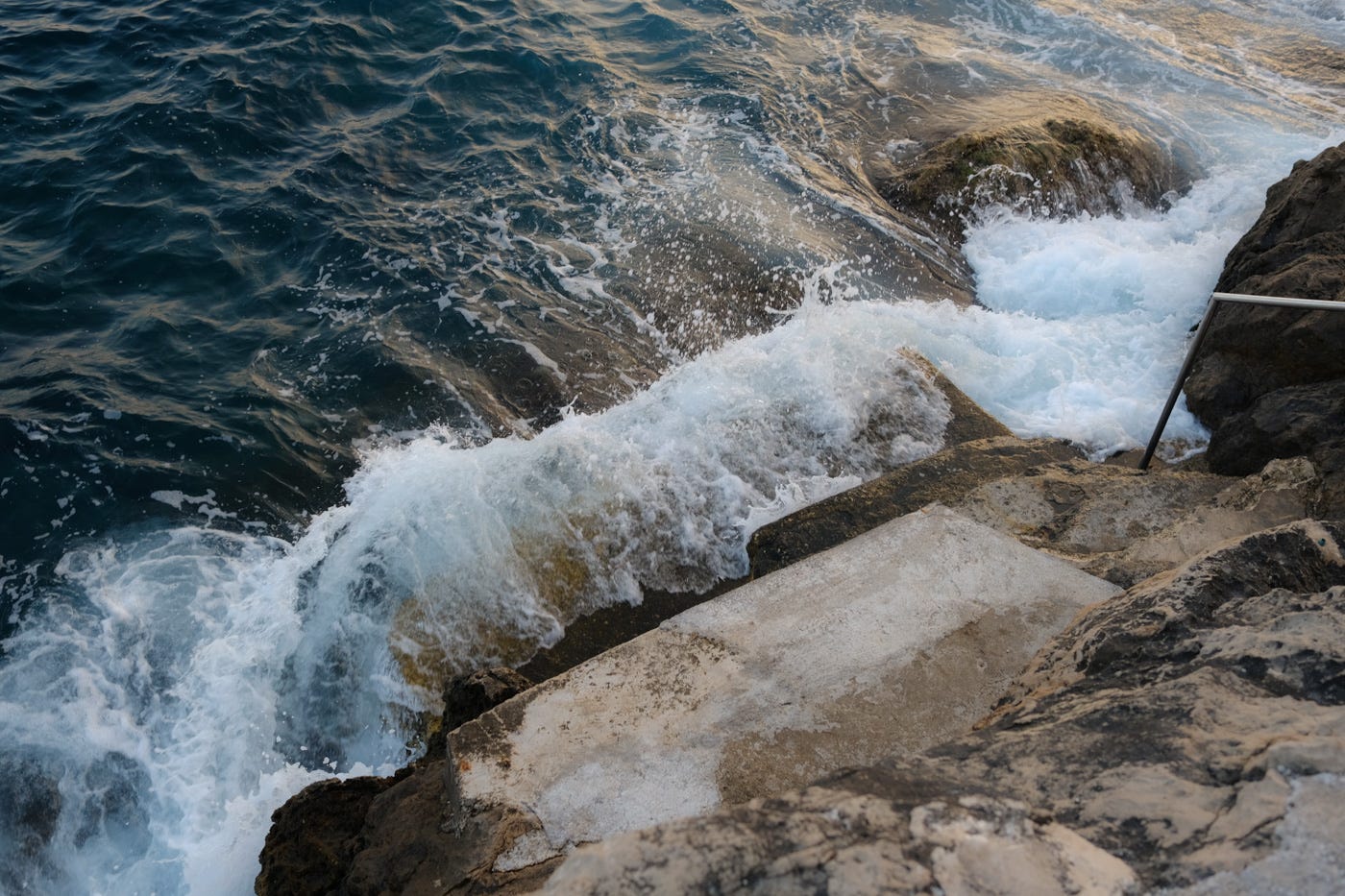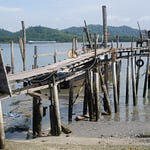Press play for an extended reading from a Murakami short story, in which a Japanese woman tells of her mother’s trip alone to Germany—during which the latter enters a lederhosen tailor’s shop and asks a German stranger to stand in for her husband for a fitting—and the subtle emotional rupture that ensues. (The exaggerated German accent hews to the translated text, so, naturally, I asked a certain German I know to read it 😆)
“That’s something even Mother herself didn’t understand at the time. It made her defensive and confused. All she knew was, looking at that man in the lederhosen, she felt an unbearable disgust rising in her. Directed toward Father. And she could not hold it back. Mother’s lederhosen man, apart from the color of his skin, was exactly like Father, the shape of the legs, the belly, the thinning hair. The way he was so happy trying on those new lederhosen, all prancy and cocky like a little boy. As Mother stood there looking at this man, so many things she’d been uncertain of about herself slowly shifted together into something very clear. That’s when she realized she hated Father.”
—Haruki Murakami, “Lederhosen” from The Elephant Vanishes
In some of my letters throughout this pandemic, I expressed how writing about anything but the most urgent events impacting the most vulnerable communities can feel futile, even though I am not a dedicated news reporter. (I mean, my writing is almost always based on reporting, but I prefer—am better at—making sense of the news cumulatively after some time has passed.) I’ve also been wanting to take this time to complete a piece of short fiction, and I’ve been finding it difficult to give myself the mental space for it. I imagine some of you must be feeling the same.
But recently, I read a piece by Tess Taylor about how communities in Belfast employ “art as civic repair”, to bridge the indelible divide left by the Troubles—a divide I saw for myself and wrote about a couple of years back. It really lifted my spirits, and made me realize again that art in all its forms, broadly interpreted, is essential, even more so in difficult times. Taylor also argues that cultural investments can serve “as pollinators, helping to rebuild the ecosystem”. It’s the same plea the Kuala Lumpur Performing Arts Centre made in its open letter, as new daily coronavirus infections in the country continued to climb, hitting a record high of 17,045 yesterday.
At one point, Taylor writes about how, three days after the 2016 elections in America which ushered in Trump’s presidency, she went on an assigned road trip through rural Virginia to write a travel article for an upscale magazine. She had been excited about the trip, but suddenly, all she felt was grief and rage. She arrived at a Friday night square dance along the Crooked Road, Virginia’s heritage music trail, feeling “suspicious of anyone who would square-dance at such a moment”. But she took a deep breath, and joined in.
In the end, she writes, “When I was done, I realized that I could be angry or I could dance, but I could not do both at the same time. I did not lose my resolve to fight for the things I care about, but I also noticed how the dance invited a small mountain community into a social contract: dancing together was a way of agreeing to care for one another.”
Anyway, here’s to the fifth volume of Landmarkings. I enjoy putting this together because it also helps me take note of what I’m paying attention to, and I hope you get as much out of it too.
Making sense of our place in the world
Michelle Kuo and Albert Wu write in their newsletter A Broad and Ample Road about returning to “the Motherland”, Taiwan, to make a new life together after already building their lives in America. From Michelle:
There is a path, though, whereby returning is not a loss, whereby global hierarchies don’t hold the sway they did for my parents. It brings me great joy to see how far ahead of me today’s Gen-Z Asian Americans are in embracing it. I’ve been electrified by that openness and curiosity in my students, and it’s inspired me to think about a version of my sense of self where I don’t have to be articulate and native, where I can learn new cultures and manifest solidarity by making myself vulnerable. It’s put me in mind of the idea of pilgrimage: leaving a familiar place, but with a purpose. That’s what my parents did: like all immigrants, they were pilgrims. They came to the U.S. so that their children could have a better life. And children, in turn, are supposed to “make their sacrifices worthwhile,” to use the line everyone repeats. But what does that mean? What makes sacrifices worthwhile? Can’t we define success in a way that allows for parents to become rooted and secure enough for their children to become pilgrims again, to continue the journey, to not stagnate?
Suzanne Joinson in Hotel Melancholia:
I grew up in a clapped-out seaside town on the south coast of England, not so many miles away from Emin’s Margate. I did everything I could to escape the shingle, the bad weather, the faded, John Betjeman‑esque hotels where I had summer jobs waitressing for sleazy hotel bosses, serving ice cream to ancient old ladies. For many years, I equated this chalky, desolate coastline and the squawking of seagulls with death: the end of the world, the end of time.
I circled the globe as many times as possible, but just as Jean Rhys found herself continually back in the same bedsits – ‘predestined, she had returned to her starting-point in this little Bloomsbury bedroom that was so exactly like the little Bloomsbury bedrooms she had left nearly 10 years before…’ – I find myself living again in a similarly run-down seaside town, a spitting distance from London, a spitting distance from Gatwick airport, walking along a tide-line scattered with cuttlefish bones and dried fish eggs. I now live close to a seafront lined with shabby hotels with names such as the Belle View and the Sea Bright. When I peer into the windows, I think of Elizabeth Bishop’s disparaging list of hotel ‘decorations’: the ‘unattractive wallpaper’ and the ‘Turkey carpets’. In the end, to remain alive, I gave up the fancy travelling job. I gave up pretending that London, or any other city, was my home and moved back to the weather and the seagulls and the shabby hotels, to work on making an uneasy peace with standing still.
David Hoon Kim in When I Lived in French:
For me, despite what French represents for many people—either a symbol of elitism or an instrument of colonialism—it was, above all, a neutral language, neither the language of my upbringing (Korean) nor the language of my immigration (English). In other words, it was an idiom that belonged entirely to me, because I was the one who had chosen it. According to Akira Mizubayashi, a Japanese author who writes in French, a language is something that exists outside of national borders: you can come and go as you please, without answering to any higher power or authority.
(More about Kim in a companion newsletter from the NYRB.)
A world at once quotidian, absurd, brutal, poignant, and extraordinary
The German Experiment That Placed Foster Children with Pedophiles by Rachel Aviv. A mind-blowing story that goes into the historical background—perhaps an overreaction to Nazism?—that permitted this experiment.
Six Months Inside One of America’s Most Dangerous Industries (i.e. a slaughterhouse), which is heavily dependent on migrant workers from Southeast Asia, Latin America, and Africa, by Michael Holtz. Quoting an HR rep: “We pretty much feed the world. That’s why when the coronavirus started, we didn’t shut down. Because you guys want to eat, right?”
At 17, biologist Juliane Diller was the sole survivor of a plane crash in the Amazon. Fifty years later she still runs Panguana, a research station founded by her parents in Peru, by Franz Lidz. Diller had fallen some 10,000 feet, but survived miraculously with minor injuries because her row of seats had landed in dense foliage, which cushioned the impact. “The jungle caught me and saved me,” she said. “I vowed that if I stayed alive, I would devote my life to a meaningful cause that served nature and humanity.” / I had heard of her story some years back while I was in Peru. If you ever get lost in the jungle, just follow the water to a river, like her, I remember someone told me.
How Singapore Is Creating More Land for Itself by Samantha Subramaniam. Remembering Lee Kuan Yew’s words: “In a world where the big fish eat small fish and the small fish eat shrimps, Singapore must become a poisonous shrimp.”
‘You have to be violent to be heard’: Northern Ireland’s teens take to the streets, by Laura Noonan—with photos that capture the wonder and weirdness of being a teen in Belfast, by Megan Doherty.
A view of home
Redang folk turn to farming to survive pandemic by Hasnoor Hussein. / The Malaysian Insight has been publishing some great photo essays that give us a close-up look at the impact of the pandemic on human lives.
Hartal Doktor Kontrak, a nationwide movement, says that doctors will strike on 26 July if their demands are not met—even as COVID-19 rages through the country, by Minxi Chua. / Update on the strike from Between The Lines.
Decision to cancel talk by renowned dancer Ramli Ibrahim reignites debate about the impact of religious conservatism on cultural traditions, by Marco Ferrarese / I also wrote about this with regards to wayang Kulit in Kelantan a while back.
How we live now
The Jessica Simulation: The death of the woman he loved was too much to bear. Could a mysterious website allow him to speak with her once more? By Jason Fagone, on Joshua Barbeau’s search for closure through AI.
From Turkey: Farm Bank let players make money, while supporting real farms. Then the CEO vanished with $80 million, by Paul Benjamin Osterlund. “In my opinion, people conned themselves,” said the app’s programmer.
The wealthy Nigerians buying citizenship overseas by Ollie Williams: “Golden visas are the lesser-reported side of the Nigerian migration story.” / This Swiss Lawyer Is Helping Governments Get Rich Off Selling Passports by Jason Clenfield
Nathan Heller from the US: The traditional home is under renovation. Can people find meaning in groups? “What can be a deliberate life-style decision in strong social democracies is a financial necessity in much of the world; the ‘intention’ in intentional community reflects some luxury of choice.” / Plus a view from Asia.
The pandemic didn’t kill Singapore’s UNESCO-listed food stalls. Delivery apps might, by Peter Guest. “Hawkers, he said, simply can’t compete on the apps, which typically charge 30% commission, wiping out any profit they could make.”
Reimagining our world
Is Poverty Necessary? An idea that won’t go away, by Marilynne Robinson.
On This German Farm, Cows Are in Charge. Or at Least Coequals, by Melissa Eddy. “No animal is there to serve a human need”.
A migrant hunger strike is shaking Belgium’s government, by Camille Gijs; and an update here on its suspension, by Jakob Hanke Vela. “Six strikers have sewn their mouths shut. Five tried to commit suicide. Some stopped drinking water.” All for the struggle to gain resident status.
Who’s Afraid of the Four Day Work Week? by Anne Helen Petersen, which includes some context on the Icelandic trials.
World’s leading economies commit to global minimum corporate tax rate, by Richard Partington.
Something to think about
In Malay, we use the term ‘lupa’ (literally: to forget or forgetting) to describe a state of ecstatic trance, a prevalent feature of ritual performance in the Malay world and Southeast Asia. While there is, of course, a sense of uncertainty and risk associated with ‘lupa’, it is also a doorway to a visceral freedom otherwise unattainable in mundane reality. In the transitory casting off of the social self, one discovers another, more essential, self. I see such liminal experience as instructive to the process of translation—perhaps in losing (ourselves and meaning) we can access hidden aspects of language, something there but yet unwritten.
—Pauline Fan
Before I go, a sound postcard of church bells in Kotor’s old town, when we made a short side trip to Montenegro.
The second part of this dispatch is here.
E.















